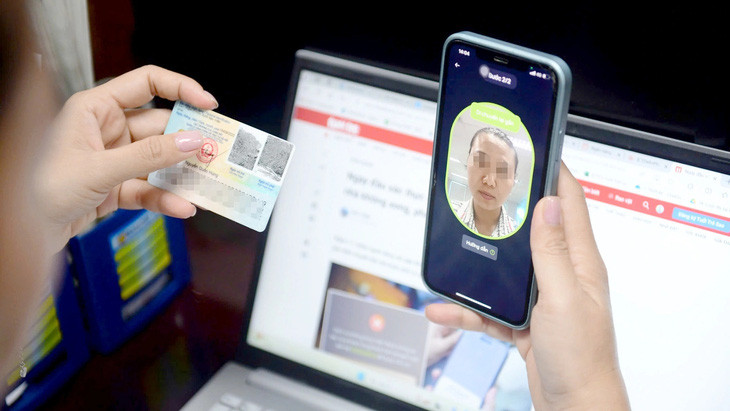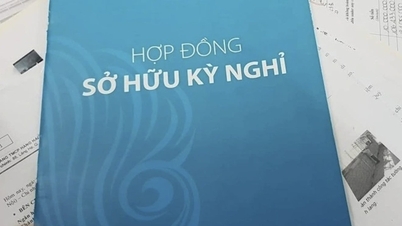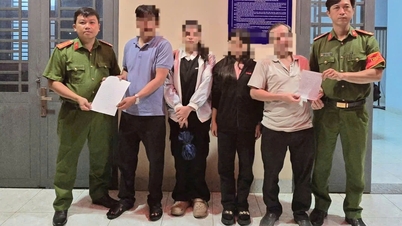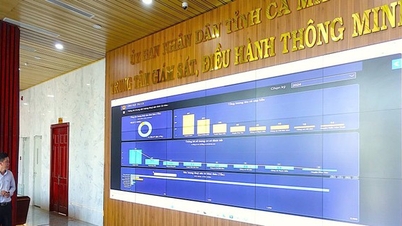Although there has been a regulation requiring biometric authentication for all online transactions from January 1, 2025 to protect account holders, cybercriminals still use tricks to trick customers into falling into traps and stealing all the money in their accounts.

Taking advantage of the policy requiring biometric authentication for some types of online transactions from July 1, 2024, and for all online money transfers from January 1, 2025, criminals Cheat require many people to install fake apps and take photos of their ID cards and facial authentication.
After installing fake software and biometric authentication, the phone will be taken over, money transferred in the account...
Lost billions of dong because of impersonating tax officials
Sharing her story of being scammed on social media recently to warn others, Ms. S., a clothing wholesaler on an online channel, said that she was contacted by a person claiming to be a tax officer and informed that she was missing tax documents. This person asked Ms. S. to go to the tax office to work.
The next morning, this person contacted her again and said that he could support her with the update online so that she would not have to go to the bank. The "tax officer" instructed Ms. S. to make a video call using another phone and operate on the main phone. Ms. S. then installed the fake apps as instructed and switched to an Android phone as instructed.
After the "prey" was caught, the "tax officer" told Ms. S. that according to the new law, a business must have a charter capital of 100 million VND, while her business had only registered capital of 15 million VND, so she had to transfer 100 million VND into the account and take a screenshot for the treasury to check.
Ms. S. followed the instructions, the "tax officer" in the newspaper was wrong and asked her to confirm FaceID. Many times like that, she ran out of money and had to borrow money to transfer because she thought that after confirming, she would transfer it back. After many times like that, she went back to her account to transfer money back to the places she borrowed from but could not access the banking app on her phone.
At this time, Ms. S. realized that she had been scammed and called the bank to check. She was informed by the bank that all the money had been taken from her account. The total amount of money lost was more than 2 billion VND. She also reported to the police but knew it would be very difficult to get it back, so she warned everyone not to fall into the same trap as her.
"When I posted the warning clip online, many people impersonated the police, banks... to contact me with the intention of scamming me again with the trick of... helping me get my lost money back. In addition, the loan shark also contacted me to ask... if I needed a loan. Luckily, when I reported it, I was warned by the police so I didn't fall into the criminals' trap," said Ms. S.
The above case is not an isolated one, many users have also fallen into the trap of similar scams. The deputy general director of a large joint stock bank said that requiring biometric authentication when making online transactions has somewhat limited fraud, but cannot eliminate it despite the banks' constant warnings.
"The criminals' trick is to lure customers into authenticating each fraudulent money transfer transaction, but the criminals do not operate," he said.
Fake calls keep attacking users
Ms. Nguyen Thanh Minh (Ha Dong, Hanoi) said that she had just received a phone call from a stranger claiming to be a police officer of Ha Dong district, inviting her to come and check her child's identity documents, with the reason being that there was a mistake in the information. However, when Ms. Minh asked specifically what information was wrong and where the district police station was, the person hung up.
Last week, Ms. Minh also received a call from someone claiming to be an electricity employee, informing her family that they had not paid the electricity bill for November and needed to pay immediately, otherwise the electricity would be cut off.
"I heard and knew it was a scammer. Because my family's monthly electricity bill is automatically debited from my bank account on the 5th of every month.
But I still asked what my customer number was for fear of confusion.
The person claiming to be an employee of Ha Dong Electricity could not answer and quickly hung up," said Ms. Minh.
Similarly, Mr. Tran Phuong (Tay Ho, Hanoi ) also received phone calls from many strange phone numbers claiming to be employees of securities companies, electricity companies, local police, tax officers... One morning, he even received four phone calls with signs of fraud.
On the morning of January 2, while driving to work, Mr. Phuong received a phone call from a man claiming to be an employee of a network operator, saying that his monthly subscription package had expired and that he was being asked to re-register.
"However, I had previously received a message from the network operator that it had automatically renewed my subscription for the entire year. If I lose my vigilance, do not check my information and click on a fake link containing malware, I can easily be scammed and lose money in my account," Mr. Phuong shared.
In a letter recently sent to customers, VPBank also warned of the tricks of cybercrime increasingly sophisticated. Impersonators of government officials such as police, tax... call and send people links, send VNeID apps containing malicious code.
If you access the links and install the app using your phone, your phone will be controlled and lost. personal information and had money stolen from his bank account.
VPBank recommends that customers do not arbitrarily install applications from untrusted sources, do not click on links/scan QR codes. lead to strange websites.
Do not provide OTP, card number information, CVV/CCV secret code in any form to anyone, including people claiming to be bank employees to avoid losing money.
Source


![[Photo] General Secretary attends the parade to celebrate the 80th anniversary of the founding of the Korean Workers' Party](https://vphoto.vietnam.vn/thumb/1200x675/vietnam/resource/IMAGE/2025/10/11/1760150039564_vna-potal-tong-bi-thu-du-le-duyet-binh-ky-niem-80-nam-thanh-lap-dang-lao-dong-trieu-tien-8331994-jpg.webp)
![[Photo] Ho Chi Minh City is brilliant with flags and flowers on the eve of the 1st Party Congress, term 2025-2030](https://vphoto.vietnam.vn/thumb/1200x675/vietnam/resource/IMAGE/2025/10/10/1760102923219_ndo_br_thiet-ke-chua-co-ten-43-png.webp)



![[Photo] Opening of the World Cultural Festival in Hanoi](https://vphoto.vietnam.vn/thumb/1200x675/vietnam/resource/IMAGE/2025/10/10/1760113426728_ndo_br_lehoi-khaimac-jpg.webp)
































































































Comment (0)